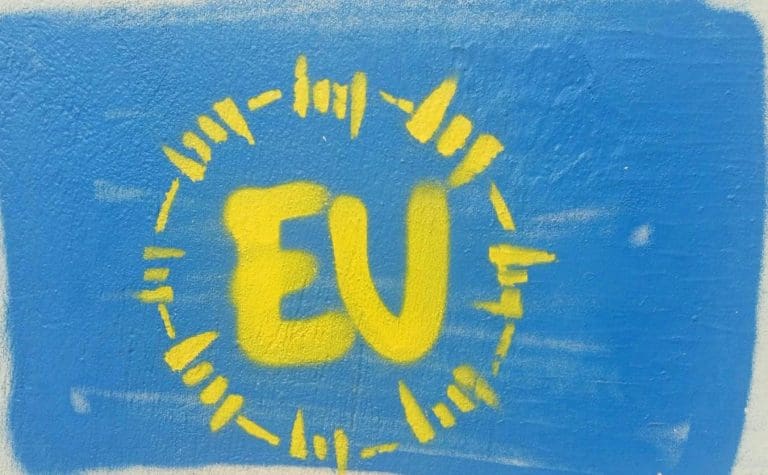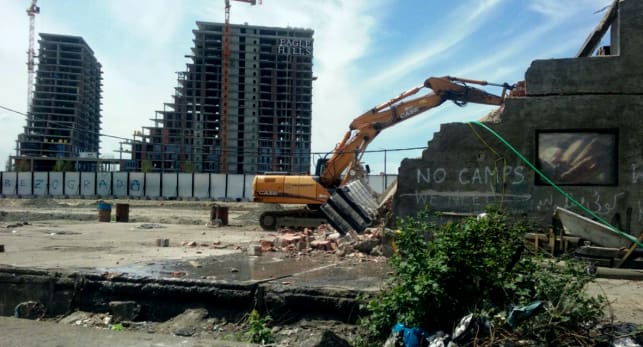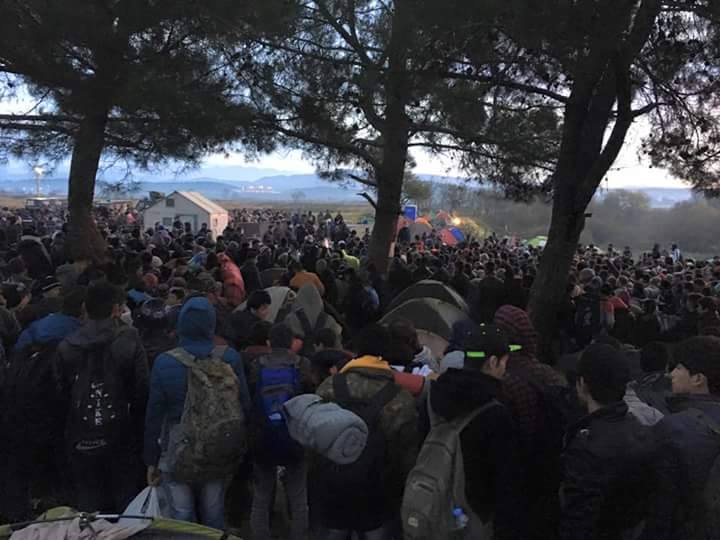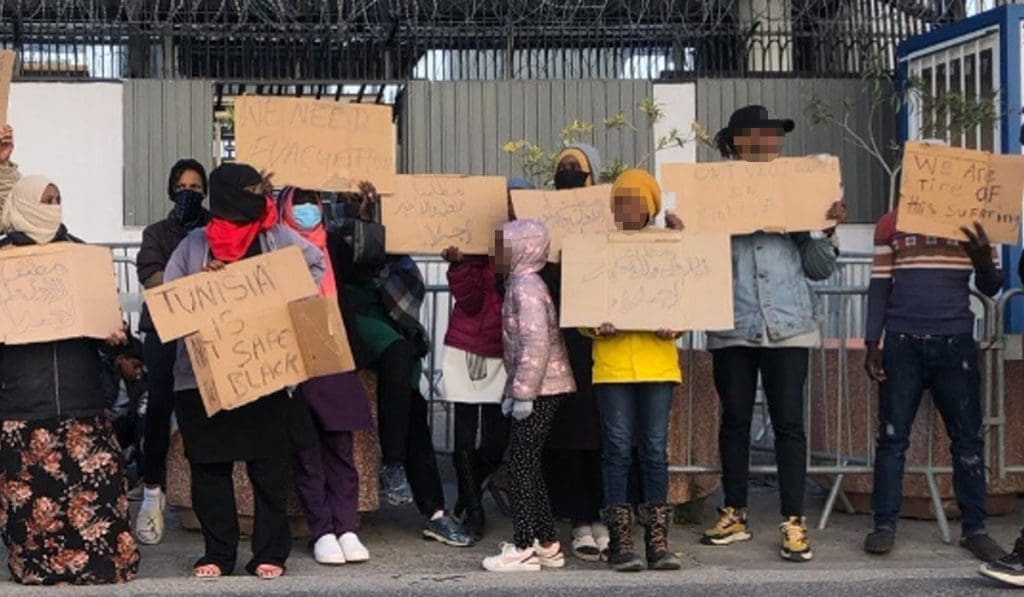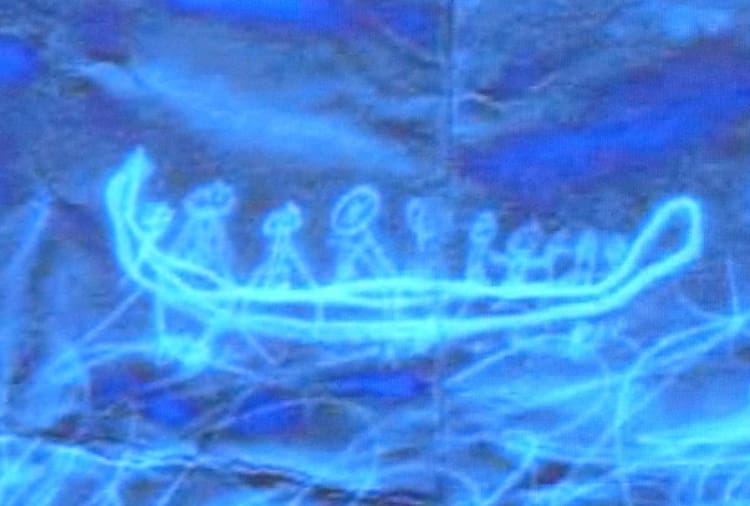Fortress Europe’s Border Crisis is Back, with a Violent Vengeance
An eyewitness dispatch from Lesvos covering much of the recent weeks’ tumults there
by Elli Mirzabagi, posted by Linke PoC (Facebook)
4 March 2020 (original post)
As thousands of asylum seekers reach Turkey’s land and sea borders with Greece, pressure has steadily been mounting on Lesvos in the wake of this geopolitical crisis. Riots, strikes, and fascist attacks against refugees, aid workers, and journalists have become more frequent, as both civic order and international law breaks down. Last Friday, Erdoğan opened the Turkish border, effectively dismantling the 2016 EU-Turkey deal that drastically stemmed the flow of refugees into Europe following the million-plus influx in 2015. Claiming this tactic was meant to garner international support for his operation in northwest Syria, this weaponization of refugee populations is nonetheless widely perceived as a threat to national security in Greece.
Here on the island, Greek authorities announced plans for a new closed detention center in Karava, in the north of the island, to replace the now infamous Moria camp, where 20,000 residents live in squalor: wading through wastewater and an incomprehensible bureaucratic maze yearning for the coveted “blue stamp” that will free them from the island-turned-prison. Stabbings, sexual violence, and suicide attempts are commonplace—an eight-year-old child in the so-called “safe zone” for unaccompanied minors under twelve is among the most recent attempts.
Riot police arrived at the port in the early hours before dawn on February 25 in anticipation of fierce opposition to construction of the new facility, and indeed clashed with local protesters for two days until they retreated back to Athens. Several hundred protesters blocked the port and the road accessing the construction site, hurling rocks and setting fires, and riot police responded in turn with tear gas and brute force.

A general strike was declared last Thursday and Friday in further protest of the closed camps, as well as the authoritarian nature of its implementation. In a singular and strange turn of events, factions on all sides of the refugee/migrant issue seemed to agree—albeit for very different reasons—that building a new closed camp was unacceptable. Refugees and left-leaning activists oppose its inhumane prison-like conditions; many islanders oppose what they perceive as an expansion rather than resolution of the problem; and fascists and far-right extremists oppose the presence of refugees within Greece at all.
On Sunday, boats and dinghies stalled at the port of Thermi for hours as islanders harassed and intimidated them, preventing exhausted and terrified passengers from disembarking. At no point did police intervene, though some were present on the scene. UNHCR’s “Stage 2,” the initial point of reception previously used in Sykamia to shelter new arrivals before they were transported to Moria, was set ablaze.
The same afternoon, our medical team started advancing from the olive groves above Moria camp in a caravan of eight cars transporting coordinators, translators, doctors, nurses, medics, social workers, and therapists to the town of Mytilini, about twenty minutes away. We had just finished our shift at the clinic providing care to those living within the camp, but no buses or taxis were running at the time. Locals had blocked both of the main roads from Moria to Mytilini to obstruct the passage of newly arriving asylum seekers.
We attempted to take an alternate path to town but ran into mobs of violent fascists on motorbikes and trucks armed with clubs, metal rods, and other rather barbaric weaponry. They appeared to be in pursuit of a group of young refugee men on foot heading in the direction of Moria, but then seemed to pivot their attention toward us. As we came upon a roadblock, they closed in, shouting and smashing the hood, windows, and car doors with fists, boots, and clubs, shattering the glass with heavy blows. Our cars became separated as each of us peeled out at whatever opportunity we had to flee. Eventually calculating that Moria was the safest place to seek refuge, we returned to the camp and stayed there overnight, departing under the cover of darkness when the streets were more quiet.

The feeling on Lesvos now is that refugees and those who aid them are not welcome, and that fascist and far-right vigilantes can terrorize these targets with impunity. In now numerous incidents, local police have either been absent, stood by passively, or—some say—abetted their activities with logistical and other forms of support. Further compounding the hostility, a widely held misconception among locals is that NGOs are profiting from the refugee situation, and are thus to be blamed for “pulling” asylum seekers to the island. While authorities have done nothing to prevent or respond to attacks against refugees, aid workers, and journalists, riot police teams are consistently deployed against protests in support of refugee rights and any large gathering of refugees.
Early on Monday morning, a rubber dinghy of forty-eight refugees and migrants capsized off the coast of Lesvos, resulting in the death of a four year old boy and the hospitalization of another child. The Greek military is now conducting so-called “military exercises” using live ammunition instead of the usual tear gas at both land and sea borders, including from Eftalou in the north to Agrielia Kratigos in the south of Lesvos. How refugees will be informed of these exercises in order to protect themselves from gunfire is unknown.
A young Syrian man has been shot and killed near Edirne at the Ipsala land border. Greek prime minister Mitsotakis denounced this as “fake news”—by now the rallying cry of rightwing populists the world over when encountering damning or otherwise inconvenient truths. Coast guards are actively driving back sea vessels carrying asylum seekers, and can be seen firing at a dinghy off the coast of Kos.
In blatant violation of international refugee law, particularly the principle of non-refoulement, Greece has suspended asylum applications for one month, and is carrying out summary detention and deportations. Plans are underway to quickly erect a closed camp in northern Greece to temporarily house all new arrivals since March 1, to be deported back to their countries of origin without registration.
The EU has yet to make any statement condemning this unilateral breach of the 1951 Refugee Convention or upholding Greece’s legal obligation to protect the rights of the displaced. In fact, European Commission president Ursula von der Leyen has praised Greece with jingoistic rhetoric for functioning as Europe’s “shield” and pledged a staggering 700 million euros for fortification of Greece’s borders.

Some four hundred asylum seekers with both red and blue stamps were mysteriously allowed to board ferries from Lesvos to Athens on March 2, and told upon arrival that they had ten to twenty days to get out of the country or be deported. Yesterday, a similar rumor had spread, and hundreds of Moria residents amassed at the port, awaiting the dim chance to escape the de facto prison that is Lesvos. Most were apprehensive but desperate enough to take the risk: “We know we are pawns in their [Greece’s, Turkey’s, the EU’s] chess game, but this could be our only opportunity to leave.” Local and riot police eventually turned up and forcibly drove people away, shouting, “Go back to Moria!” and “No ship!”
The motive and authority behind the clandestine move to permit some asylum seekers passage to the mainland is unknown, and speaks to the current climate of lawlessness and disorder. Legal advisors have warned that this could be a trap set up by the state or other shadowy actors to lure refugees to Athens for immediate deportation based on illegal movement.
The signs of surging nativism have been evident for months. The conservative government led by “New Democracy” came into power last July and has since adopted punitive policies toward asylum seekers, leaving little room for humanity. Proposed plans included building a floating barrier around the perimeter of the island to physically bar refugees from reaching shore. The island’s lifejacket graveyard, once a moving symbol of the scale and hardship of those enduring the harrowing sea journey to arrive at supposedly safe shores, went up in flames a few weeks ago after a fire was deliberately set. Last month, seven young men affiliated with Golden Dawn, Greece’s neo-Nazi party with longstanding ties to Greek police, were arrested in the midst of a planned attack against Moria residents. Hundreds of new arrivals languishing at the north shore and the Mytilini port have been forced to sleep outside, blockaded by local residents from entering the island and reaching Moria.
Greece has requested reinforcements from Frontex, the EU’s notorious border control agency, and expects air, land, and sea support in the coming days in order to exert maximum force against entry. This will only mean further state-sponsored violence and oppression of some of the most vulnerable populations already fleeing torture, armed conflict, and other forms of persecution.
As the rising specter of far-right and fascist elements in Lesvos triggers street violence and a collapse of public order, the EU has simultaneously lost all legitimacy as harbingers of human rights, justice, and the rule of law. This was apparent in the ruthless austerity measures it imposed on Greece beginning in 2010 to combat the government’s debt crisis, in the 2016 deal with Turkey to buy its cooperation in restricting the movement of refugees, and again now, as it shamelessly denies the humanity of millions in the interest of its own plainly racist political agenda.
All images via No Border Kitchen Lesvos (Facebook) and One Happy Family Lesvos (Facebook), both of which pages we recommend readers follow for updates on the grave situation at the barred gates of Fortress Europe. In the few days since this post was written, even more self-organized refugee solidarity infrastructure on Lesvos has been attacked by fascists, including One Happy Family’s well-appointed social center (destroyed by fire) and the autonomous search-and-rescue boat Mare Nostrum.
Other reliable sources: RefuComm (Facebook) and Are You Syrious? (Facebook)


